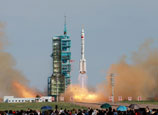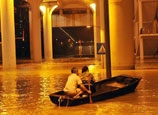
JIUQUAN, June 11 (Xinhua) -- The expectation within Ji Shisan grew stronger and stronger as he waited for the launch of the Shenzhou-10 spacecraft at the Jiuquan Satellite Launch Center in the Gobi desert of northwest China.
Ji, founder of science club Scientific Squirrel and popular science website Guokr.com, said that the more other people told him about viewing spacecraft launches live, the stronger his desire became to have this privilege himself.
His wishes came true when he joined around 1,000 spectators, mostly ordinary members of the public, who were accepted to witness Shenzhou-10's blast-off up close on Tuesday afternoon.
"I have long watched spacecraft launches on TV, when I could only see the scenes and hear the sounds. But watching at the scene this time must be three-dimensional," Ji said as he waited excitedly at the Jiuquan launch center.
"Many people who have witnessed on-site launches said a strong heatwave flaps upon the spectators. Wow, the feeling must be very special," he added.
While Ji and the other lucky spectators will no doubt leave with lifelong cherished memories, people across China have been inspired by the mission. For many, they are now thinking about the fantastical possibilities of space travel, while the mission is offering members of the public accessible insights into this field of science.
During the fifth manned space mission, astronauts will deliver science lectures to students on Earth through a live video feed system while in orbit.
The lectures could be the forerunner of future space lessons in which kids on Earth can acquire knowledge from the moon and Mars, while people born on the two planets can get understanding of Earth through long-distance simulations, Ji speculated.
He hopes that he can enter space within his lifetime and maybe even meet beings from other celestial bodies.
"In outer space, people would be able to see themselves from another angle and it is the same with meeting extraterrestrial life. The aliens could have quite different understandings of time, space and even life. Through contact with them, humankind could again examine the meanings of life," Ji said.
Entering outer space is an equally tantalizing prospect for Yu Jun, an editor of Guokr.com.
Yu said that if he got the chance to go, he would spend much time taking photos of Earth. "We can watch Venus, Mars, Saturn and Jupiter at home through an astronomical telescope, but we could only view Earth after leaving it," he explained.
"I would also wish to watch the stars without the obstruction of atmosphere," added the editor.
Liu Cixin, one of China's best-selling science fiction writers, said that entering outer space means seeing other worlds and he believes he could accomplish his dream of going there within his lifetime.
Liu started to publish his Three-Body trilogy in 2008, namely "Three-Body," "Dark Forest" and "Dead End," attracting huge attention from sci-fi fans.
"Mankind's space exploration is in the initial period and therefore carries lots of risks. But with further scientific development, it could become a normal thing for average citizens. Aeroplane flights within the atmosphere is a good example," said Liu.
The author predicted that in a century, mankind could set their footsteps on all planets in the solar system and there could be many people living on Mars and the moon.
Heavy industries could be transferred to the geostationary orbits of Earth, many people could work in outer pace and space travel could become as simple as taking an aeroplane flight, he said.
"Outer space will surely become a major part of people's everyday life, and it won't be mysterious and remote from us any longer," added Liu.
Zhao Yang, a deputy research fellow at the China Science and Technology Museum, hailed Tuesday as "the day for space fans." Zhang majored in space program history and is a big spaceflight and sci-fi fan.
Mankind is terricolous and could feel very uncomfortable while losing gravity in space and meanwhile, long-term space flights could exert huge psychological pressure, Zhao noted.
To ease these issues, he suggested, "We could use real-life simulation and network technologies to let astronauts feel at home and speak with their family back on Earth."
Zhao believes that in 100 years, humankind will have landed multiple times on Mars and established settlements on the south and north poles of the moon.
Meanwhile, man will have sent artificial-intelligent probes powered with electric rockets and photon-sail technologies on their maiden trips to the star Alpha Centauri 4.2 light-years away. And scientists could reach there in decades and send data back to Earth, the academic said.
"At that time, detectors, wires and cameras could be skins, ears, eyes and the brain of a scientist," according to Zhao.
"Although I couldn't go there, my imagination has already been!" he added. 


















![]()
